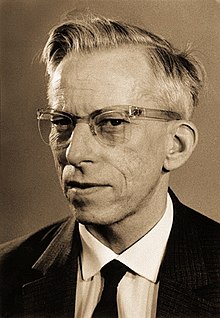Otto Wichterle
| Otto Wichterle | |
|---|---|

Prof. Otto Wichterle
|
|
| Born |
27 October 1913 Prostějov, Moravia, Austria-Hungary |
| Died | 18 August 1998 (aged 84) Stražisko, Czech Republic |
| Nationality | Czech |
| Alma mater | Czech Technical University in Prague |
| Signature | |
Otto Wichterle (Czech pronunciation: [ˈoto ˈvɪxtr̩lɛ]; 27 October 1913 in Prostějov in Austria-Hungary, now the Czech Republic – 18 August 1998) was a Czech chemist, best known for his invention of modern soft contact lenses.
His father Karel was co-owner of a successful farm-machine factory and small car plant but Otto chose science for his career. After finishing high school in Prostějov, Wichterle began to study at the Chemical and Technological Faculty of the Czech Technical University (now the independent University of Chemistry and Technology, Prague) but he was also interested in medicine. He graduated in 1936 and stayed at the university. In 1939 submitted his second doctorate thesis on chemistry, but the Protectorate regime blocked any further activity at the university. However, Wichterle was able to join the research institute at Baťa's works in Zlín and continue his scientific work. There he led the technical preparation of plastics, namely polyamide and caprolactam. In 1941, Wichterle's team invented the procedure to throw and spool polyamide thread thus making the first Czechoslovak synthetic fiber under the name silon (the invention came independently of the original American nylon procedure in 1938). Wichterle was imprisoned by the Gestapo in 1942 but was released after a few months.
...
Wikipedia
